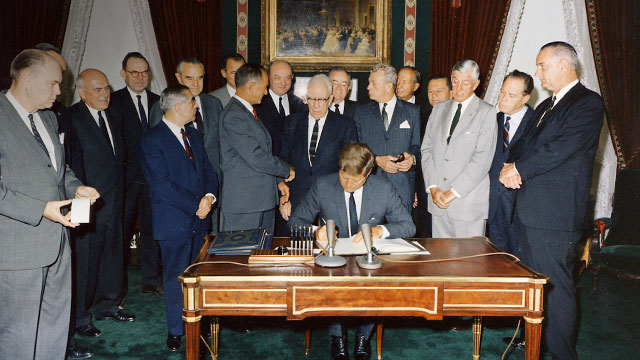BERLIN | VIENNA (IDN) – The Comprehensive Nuclear-Test-Ban Treaty Organization (CTBTO) is organising a symposium on the role of science and diplomacy for peace and security as the first in a series of events this year to push for entry into force of a law prohibiting atomic explosions by everyone and everywhere.
The ‘Science & Diplomacy for Peace & Security’ conference is being convened from January 25 to February 4 at the Vienna International Centre, the UN headquarters in the Austrian capital, in a year that marks the 20th anniversary of the Comprehensive Nuclear-Test-Ban Treaty (CTBT).
Participants in the symposium will include some of the lead negotiators of the CTBT in the Conference on Disarmament in the mid-1990s.
Keynote speakers will include the CTBTO Executive Secretary Lassina Zerbo, Joseph Cirincione, President, Ploughshares Fund and David Strangway, President Emeritus, University of British Columbia and Canada Foundation for Innovation.
The importance of this event lies in the fact that though the CTBT is almost universal it has yet to become law. Since it opened for signature in 1996,183 countries have signed the Treaty. 164 of them have also ratified it, including three of the nuclear weapon States: France, Russia and the United Kingdom. But 44 specific nuclear technology holder countries must sign and ratify before the CTBT can enter into force.
Of these, eight are still missing: China, Egypt, India, Iran, Israel, North Korea, Pakistan and the USA. On the other hand, India, North Korea and Pakistan have yet to sign the CTBT. In fact the three countries have violated the de facto moratorium and tested nuclear weapons since 1996: India and Pakistan in 1998, and the Democratic People’s Republic of Korea (DPRK) in 2006, 2009, 2013 and on January 6, 2016.
In run-up to the symposium, the CTBTO head Zerbo highlighted the CTBT’s role as a “game changer” for global peace and security. Referring to the DPRK’s nuclear test announced on January 6, he said: “Without a global system for monitoring and detecting signs of nuclear explosions, and no means of transmitting the relevant data in a timely and non-discriminatory manner, the international community would not be empowered to draw conclusions on the nature of an event.”
Addressing the Annual Conference of the Academic Council on the United Nations System – ACUNS on January 13, in Vienna, he said: “The very existence of the CTBT has all but put a stop to nuclear testing. Many States condemned the announced test as breaking with a de facto norm against testing. While this demonstrates that the Treaty is as important as ever, it is also a wake-up call to finally bring it into force,” he told ACUNS delegates.
It is hardly known that a verification regime to monitor the globe for nuclear explosions is nearing completion with around 90 percent of the 337 planned International Monitoring System facilities already in operation.
In view of the fact that the threat of nuclear weapons has faded from public concern and mainstream news media provide little coverage of the subject, together with the Atomic Reporters, CTBTO will debate on January 26 “If nuclear weapons and nuclear testing are a great risk to life on earth, are news media failing the public by not paying them more attention?”
Nevertheless, as Zerbo pointed out, time is ripe for the CTBT entering into force. The Iran deal after two years of negotiations and several years of hard work behind the scene, he said, shows that multilateral collaboration can effectively overcome intractable problems.
“Many of the key players in the Iran deal – such as EU High Representative Mogherini – are now talking about CTBT entry into force as the next big goal in disarmament and non-proliferation, which can be achieved with a similar approach. Let’s make her words a reality,” he told ACUNS delegates.
The forthcoming symposium will carry forward the message emerging from the 9th Ministerial-level Conference on Facilitating the Entry into force of the CTBT on September 29 at the United Nations headquarters in New York.
The conference was co-chaired by Erlan Idrissov, Foreign Minister of the Central Asian Republic of Kazakhstan, and Japan’s Foreign Minister Fumio Kishida.
The Kazakh Foreign Minister warned delegates he would be “blunt, even undiplomatic” in pushing for a legally binding nuclear test ban. “Our countries (Kazakh and Japan) have the moral right to be aggressive about abolishing nuclear weapons.”
Co-chair Kishida highlighted Japan’s historical role and obligation to work with the international community to ban nuclear tests and nuclear weapons, making particular reference to this year’s 70th anniversaries of the bombings of Hiroshima and Nagasaki and the experience of nuclear-bomb survivors, the Hibakusha.
The Conference was attended by a large number of Foreign Ministers from ratifying states, as well as Members of the Group of Eminent Persons (GEM), including the EU High Representative Mogherini, former UK Secretary of State for Defence Lord Desmond Browne, Commissioner of the Japan Atomic Energy Commission Ambassador Nobuyasu Abe, former UN High Representative for Disarmament Affairs Angela Kane, and CTBTO Executive Secretary Emeritus Wolfgang Hoffmann.
Some of them will also be participating in the Science & Diplomacy For Peace & Security symposium in Vienna.
The Conference, also known as the Article XIV Conference in accordance with the relevant Treaty article, adopted a Final Declaration, which affirms, “that a universal and effectively verifiable Treaty constitutes a fundamental instrument in the field of nuclear disarmament and non-proliferation”.
Note: This is the first in a series of four articles flagged ‘CTBTO: Acronym of the Year’. [IDN-InDepthNews – 20 January 2016]
Related link: http://www.indepthnews.info/index.php/global-issues/2675-new-study-says-next-generation-remains-oblivious-to-nuclear-dangers
Photo: Achieving a nuclear test ban treaty became a major initiative of JFK’s presidency. This was during the most dangerous period of the Cold War with the Soviet Union. Credit: CTBTO

